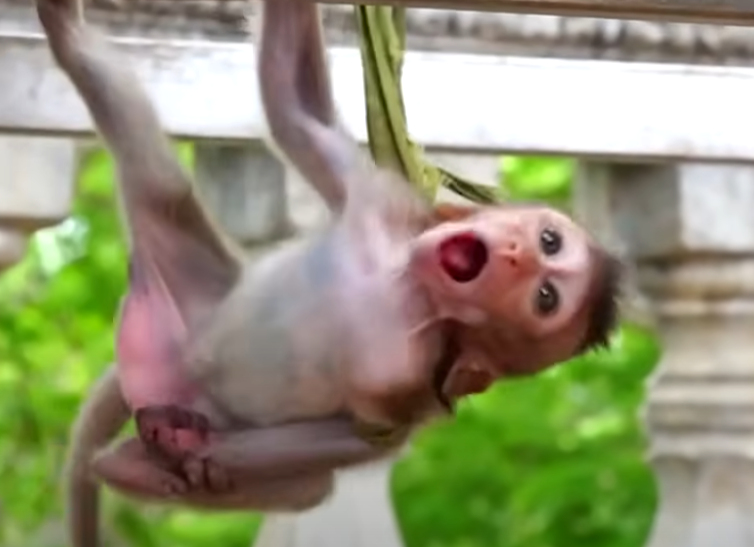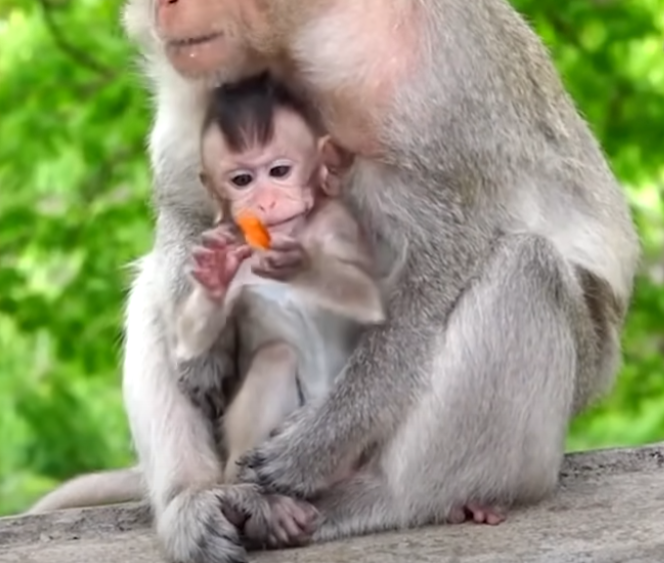The early morning mist still hugged the roots of the towering Angkor Wat trees when the cries began—sharp, frightened, and far too young to be alone.
It was a sound that pierced the heart.


Hidden among thick brush and dry branches, a tiny baby monkey named Luma had become trapped beneath a tangle of fallen vines and bamboo. Her small legs were caught, her arms too weak to pull herself out. Every time she tried to lift her trembling body, she whimpered louder, her voice echoing off the ancient stones that once heard the chants of monks.
Just a few feet away, her mother—whom we call Soriya, meaning “sunlight”—paced frantically. Her eyes were wild with fear. Soriya was a seasoned mother, but even her maternal instincts couldn’t find a solution fast enough. She screamed, slapped the ground, and clawed desperately at the branches around her baby.
Onlookers who had gathered froze, not daring to move, afraid that stepping closer might scare the mother away. One elderly guide near us, who’d been walking these forest paths for decades, whispered, “She’s trying everything. She’s breaking inside.”
Luma wasn’t just any monkey to Soriya—she was her youngest, born weak during last month’s heavy rains. And since that day, Soriya had carried her constantly, shielding her from bigger males, from other curious juveniles, and even from distant dangers in the forest. Now, that same little heartbeat was stuck beneath roots as tough as stone.
And what could a mother do?
The panic in Soriya’s movements grew. She tugged at the vines—hard—then paused and softly nuzzled Luma’s face. The baby stopped crying for a breath. Their eyes met, and in that second, even the birds seemed to stop singing. It was the purest, most vulnerable moment: a trapped baby looking to the one creature in the world who could save her… and a mother feeling utterly powerless.
Soriya began calling—deep, guttural cries that seemed to summon the entire forest. And it worked. Other monkeys appeared. A few climbed down hesitantly, unsure of what was happening. One female, possibly Soriya’s sister, joined her in pulling apart a branch. Another watched from above. The troop, sensing something was wrong, circled slowly.
Together, they began to help.
A young male jumped down and yanked at the thicker roots. For a moment, Luma squealed louder, frightened, but Soriya gently cradled her head, humming low in a comforting purr. She stayed by her baby’s side while others chipped in—not because they knew how to fix the problem, but because this mother’s grief moved them too.
It took over thirty agonizing minutes.
And then, with one final pull, the vines loosened just enough. Soriya slipped her arms underneath Luma’s tiny body and pulled her free. The baby clung tightly to her mother’s chest, burying her face in the familiar warmth. The entire forest seemed to exhale.
Cheers rose silently among the few who had watched—tears streamed down some of our cheeks.
There was no celebration from Soriya. Just a quiet retreat. She climbed slowly up a tree, cradling her baby, licking the dirt and leaves off her fur, whispering in her monkey way: You’re safe now.
We stood in silence, watching the pair disappear into the jungle’s golden haze.
There are moments when nature reminds us how strong love is. This was one of those moments—raw, painful, powerful. A mother didn’t give up. And in the end, she didn’t have to.